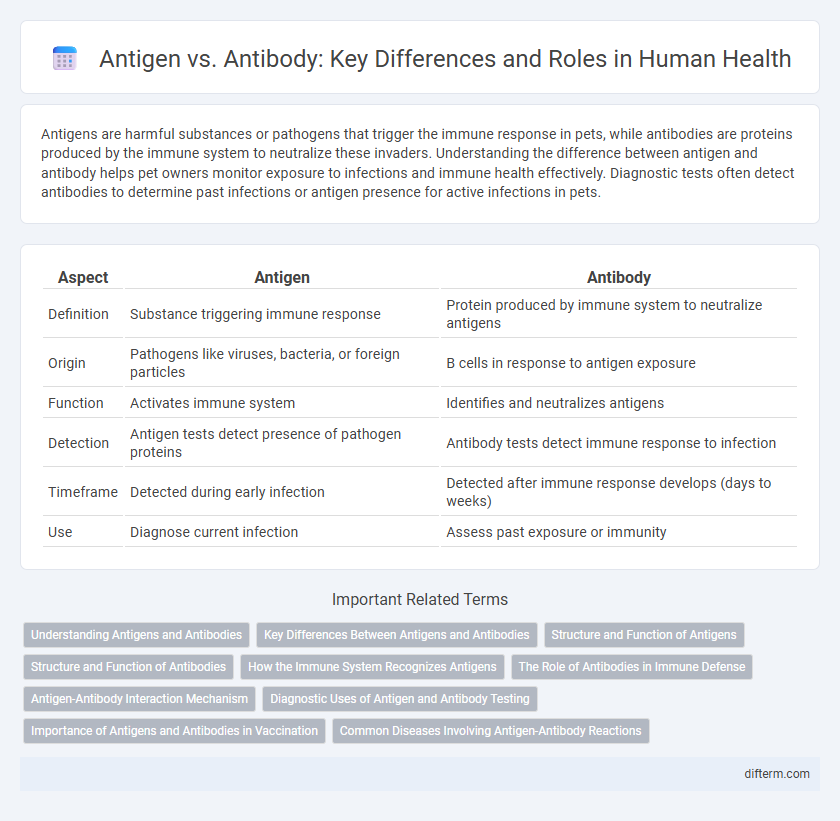Antigens are harmful substances or pathogens that trigger the immune response in pets, while antibodies are proteins produced by the immune system to neutralize these invaders. Understanding the difference between antigen and antibody helps pet owners monitor exposure to infections and immune health effectively. Diagnostic tests often detect antibodies to determine past infections or antigen presence for active infections in pets.
Table of Comparison
| Aspect | Antigen | Antibody |
|---|---|---|
| Definition | Substance triggering immune response | Protein produced by immune system to neutralize antigens |
| Origin | Pathogens like viruses, bacteria, or foreign particles | B cells in response to antigen exposure |
| Function | Activates immune system | Identifies and neutralizes antigens |
| Detection | Antigen tests detect presence of pathogen proteins | Antibody tests detect immune response to infection |
| Timeframe | Detected during early infection | Detected after immune response develops (days to weeks) |
| Use | Diagnose current infection | Assess past exposure or immunity |
Understanding Antigens and Antibodies
Antigens are foreign molecules or pathogens that trigger an immune response by being recognized as threats by the body, whereas antibodies are specialized proteins produced by B cells to identify and neutralize specific antigens. The immune system's ability to distinguish between self and non-self molecules hinges on the precise interaction between antibodies and antigens. Understanding the structure and function of antigens and antibodies is crucial for developing vaccines, diagnostics, and targeted therapies in immunology.
Key Differences Between Antigens and Antibodies
Antigens are foreign molecules or pathogens that trigger an immune response, whereas antibodies are specialized proteins produced by B cells to recognize and neutralize specific antigens. Antigens can be components of viruses, bacteria, or toxins, while antibodies bind to antigens to help eliminate them from the body. The key difference lies in their roles: antigens initiate the immune response, and antibodies provide targeted defense against those antigens.
Structure and Function of Antigens
Antigens are typically protein or polysaccharide molecules present on the surface of pathogens, triggering an immune response by being recognized as foreign. Their structure includes specific regions called epitopes, which bind to antibodies or antigen receptors on immune cells, initiating defense mechanisms. Antigens function to activate immune cells, leading to the production of antibodies that specifically target and neutralize the invading pathogen.
Structure and Function of Antibodies
Antibodies are Y-shaped proteins produced by B cells, composed of two heavy chains and two light chains connected by disulfide bonds, enabling specific antigen binding. Their variable regions recognize and bind unique epitopes on antigens, while the constant region mediates immune responses through opsonization, neutralization, and activation of the complement system. This structural design allows antibodies to identify pathogens precisely and facilitate their elimination from the body.
How the Immune System Recognizes Antigens
The immune system recognizes antigens through specialized cells called antigen-presenting cells (APCs), which capture and process foreign molecules, displaying them on their surface using major histocompatibility complex (MHC) proteins. T cells identify these antigen-MHC complexes via their T cell receptors (TCRs), triggering an immune response tailored to eliminate the invading pathogen. Antibodies, produced by B cells, specifically bind to antigens, neutralizing them and marking them for destruction by other immune cells.
The Role of Antibodies in Immune Defense
Antibodies are specialized proteins produced by B cells that recognize and neutralize pathogens such as viruses and bacteria. They bind specifically to antigens, marking them for destruction by other immune cells and preventing infection spread. The presence of antibodies also aids in immunological memory, ensuring a faster and stronger immune response upon subsequent exposures to the same pathogen.
Antigen-Antibody Interaction Mechanism
Antigen-antibody interaction involves the specific binding of antibodies to unique epitopes on antigens, forming antigen-antibody complexes essential for immune defense. The antigen-binding sites of antibodies recognize molecular structures on antigens through non-covalent forces such as hydrogen bonds, ionic interactions, and van der Waals forces, ensuring high specificity and affinity. This binding triggers immune responses including neutralization of pathogens, opsonization, and activation of the complement system, facilitating the clearance of foreign substances from the body.
Diagnostic Uses of Antigen and Antibody Testing
Antigen testing detects specific proteins from pathogens, enabling rapid diagnosis of active infections such as COVID-19 or influenza. Antibody testing identifies immune responses by detecting antibodies produced after exposure, useful for assessing prior infection or vaccine-induced immunity. Both diagnostic methods complement each other, with antigen tests confirming current infection and antibody tests evaluating past exposure or immune status.
Importance of Antigens and Antibodies in Vaccination
Antigens trigger the immune system by identifying foreign pathogens and stimulating the production of specific antibodies, which neutralize or mark these invaders for destruction. Vaccination introduces harmless antigens to safely prime the immune response without causing disease, enabling rapid antibody production upon future exposure. The precise interaction between antigens and antibodies ensures effective immunity, reducing the severity and spread of infectious diseases.
Common Diseases Involving Antigen-Antibody Reactions
Antigen-antibody reactions play a crucial role in the immune response to infectious diseases such as HIV, Hepatitis B, and Influenza, where antigens trigger the production of specific antibodies. Autoimmune disorders like Rheumatoid Arthritis and Systemic Lupus Erythematosus involve abnormal antigen-antibody interactions leading to tissue damage. Understanding the dynamics of these reactions is essential for developing targeted diagnostics and immunotherapies.
Antigen vs Antibody Infographic

 difterm.com
difterm.com